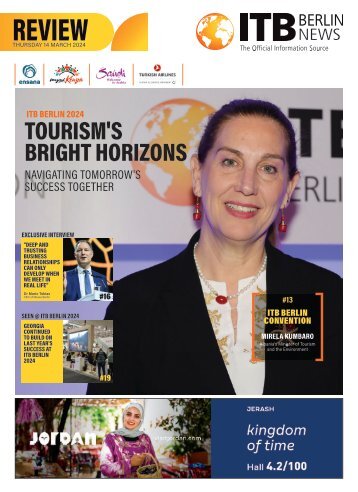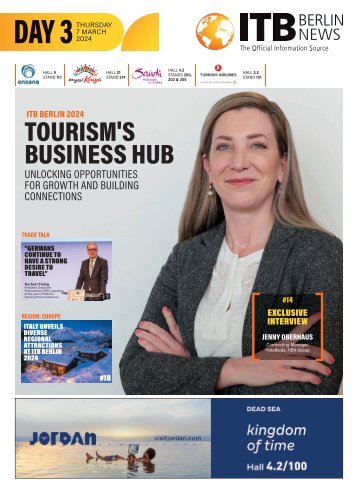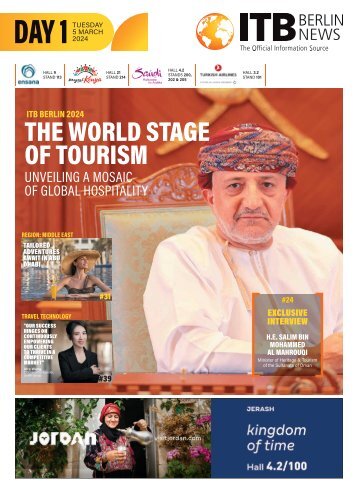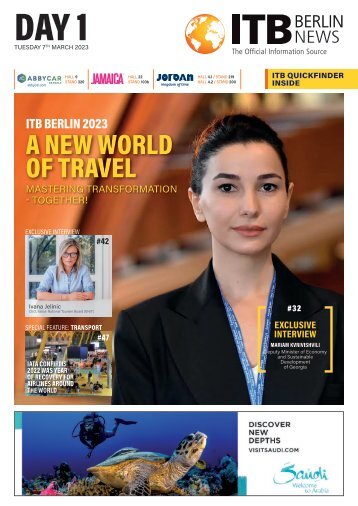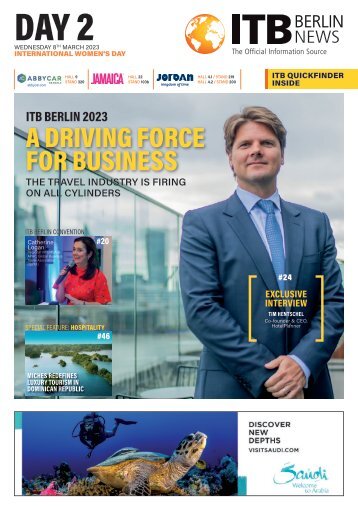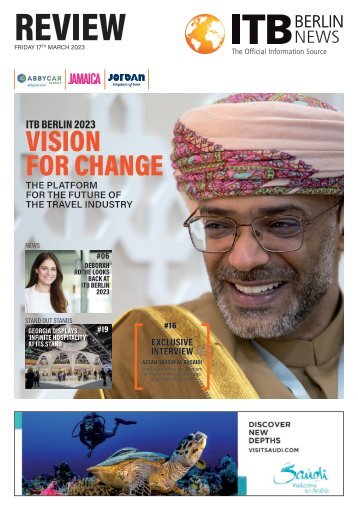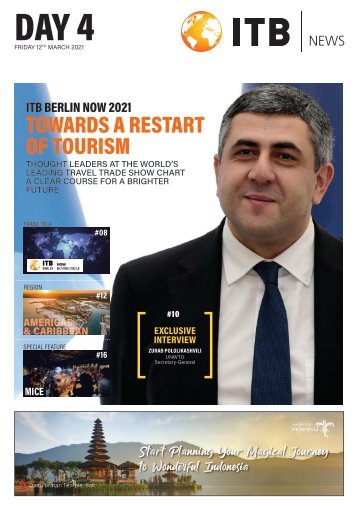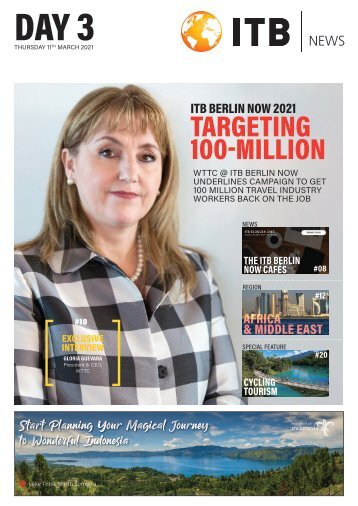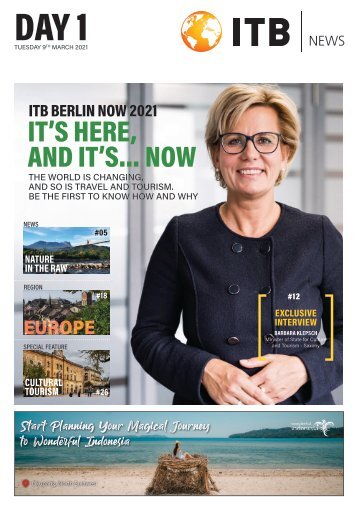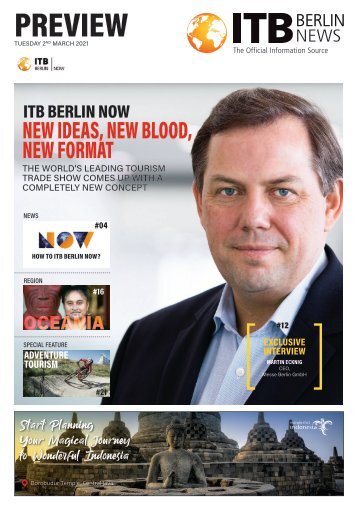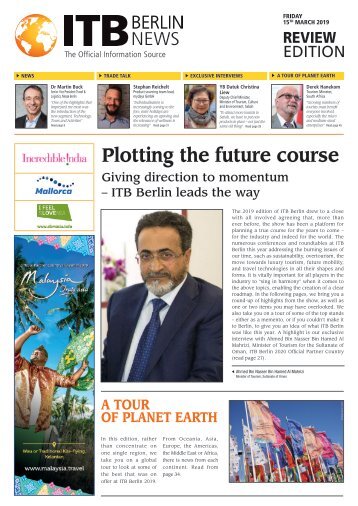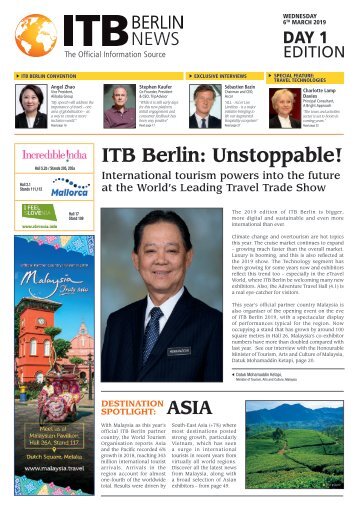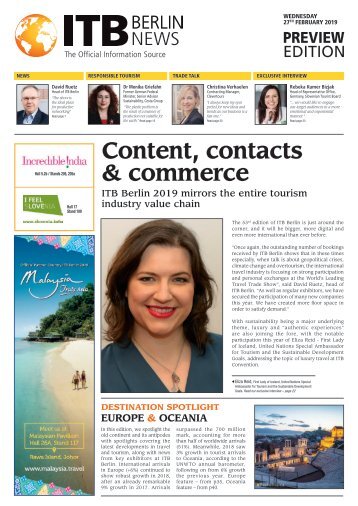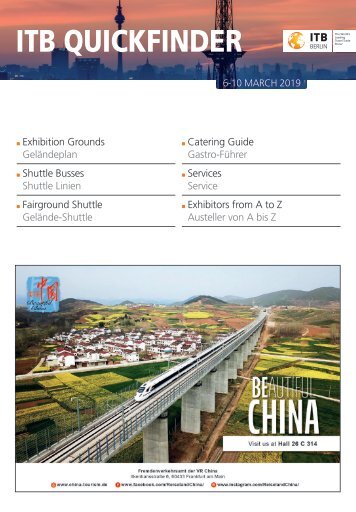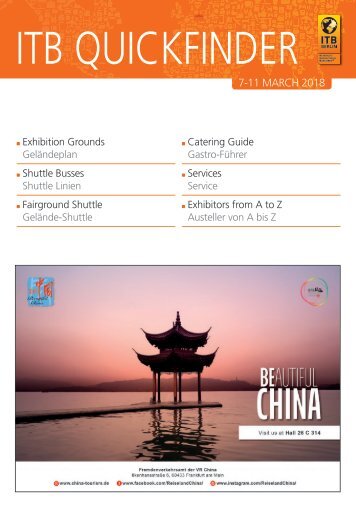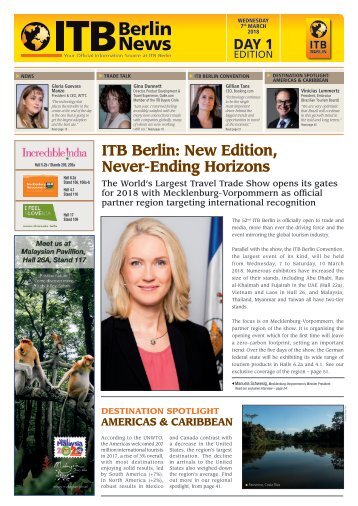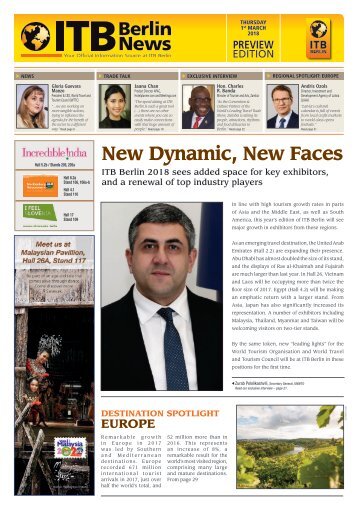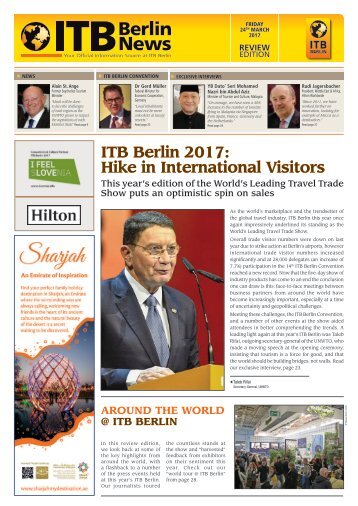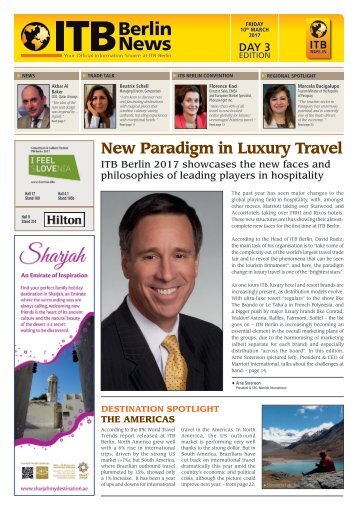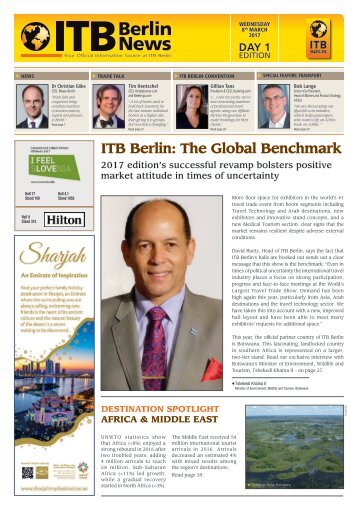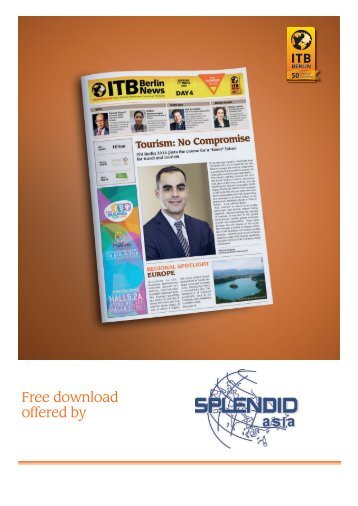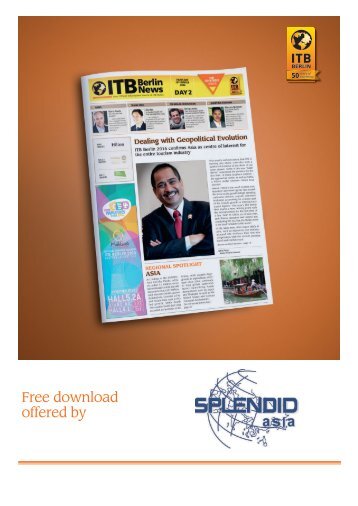
ITB Berlin News 2018 - Preview Edition
- Text
- Tourism
- Hotels
- Tours
- Resort
- Berlin
- Exhibitors
- Resorts
- Halle
- Tourismus
- Aussteller
- Www.cleverdis.com
28 REGION EUROPE Private
28 REGION EUROPE Private Accommodation in Europe 2010-2020 PhocusWright revisits the spiny topic of this “parallel” market In just five years, Europe’s private accommodation marketplace has witnessed explosive growth. Renting is common among European travellers, and a surge in bookings has fuelled growth of online distribution platforms. At the same time, a new generation of owners and hosts are getting into the rental game. A new report by PhocusWright provides sizing and projections for Europe’s private accommodation landscape, and identifies the key players, trends and challenges that characterise the market. A study published by PhocusWright late last year is a follow-on from one done by the organisation in the early part of the decade. Indeed, Phocuswright first undertook research into the European vacation rental marketplace in a comprehensive study, European Vacation Rental Marketplace: 2011 2013. At the time of its publication, the report highlighted a formidable market characterized by a large volume of bookings (approximately €25 billion in 2010), strong growth and a wide variety of inventory across Western Europe. As important and especially when compared to the US market the vacation rental segment in Europe was well recognised by consumers, and driven to a great extent by large, well-established vacation rental brands, often operating at a national level. Despite these healthy indicators, the study found that the market was still immature and a bit messy from a supply, distribution and technology perspective. This new report revisits Europe’s dynamic marketplace for private accommodation rentals to understand how the segment has evolved since 2011, and where it is headed. Renting is commonplace, rental stays have become more hotellike, and most European travellers view renting as a solid mainstream accommodation option. In addition, the market has moved online, with online distribution shifting from VRMCs to online intermediaries, including rental sites like Airbnb and OTAs such as Booking.com. As the market has evolved, a path has been cleared for a new generation of owners and hosts, as well as new types of rentals. European homeowners many of whom are younger and choose to manage the property rental on their own are renting their primary residences in some of Europe’s largest cities. The once typical vacation rental listing a secondary residence in a traditional beach or country setting and managed by a professional rental management company is now but one of a plethora of private accommodation choices available to European travellers. KEY FINDINGS Bigger, faster, stronger. Europe’s private accommodation market is growing faster than accommodations overall, and faster than the broader travel market. From 2010 to 2020, the market is projected to add €20 billion in value. Renting is routine. The share of European travellers who rent is higher than in the U.S., and more than half of European non renters have considered renting in the past year. Digital dominates. Nearly half of all rental revenue in 2016 was booked and paid for online. And even for offline bookings, renters rely heavily on online listings, reviews and communication. Alternative is over. Private accommodation in Europe is now a primary form of accommodation, driven in large part by the burgeoning millennial traveler population. European travellers see rentals as mainstream, rather than as a niche lodging category. Home or hotel? With the advance purchase window and average trip length shortening for rentals, private accommodation now competes more directly with hotels, especially in Europe’s urban markets. Price and location are primary drivers for both categories. Owners are ascendant. Two in three owners began renting in just the past three years, and the European rental market is awash in new hosts/owners. The share of rental by owner (RBO) listings has grown dramatically. Intermediaries abound. While traditional European vacation rental brands continue to have a strong presence in the market, online intermediaries have been the fastest growing distribution channel for private accommodation. Airbnb, Booking.com and others claim an increasing share of the space. Urban rentals remap the market. City rentals now account for one fourth of Europe’s private accommodation bookings. Growth in urban rentals is being driven by younger hosts, many of whom rent out their primary residences SIZE OF THE TOTAL EUROPEAN ACCOMMODATION MARKET, 2010-2020 (€B) ANNUAL CHANGE FOR HOTELS AND PRIVATE ACCOMMODATION, 2010-2020 ITB BERLIN NEWS • Thursday 1 st March 2018 www.itb-berlin-news.com
EUROPE REGION 29 Chinese Tourists Love Europe – More and More Tom Jenkins CEO, ETOA ETOA TELLS PARLIAMENT: BREXIT IS ALREADY DAMAGING THE INBOUND TRAVEL INDUSTRY According to the latest results of the Long-Haul Travel Sentiment Survey and Index Chinese willingness to travel overseas remains positive in the first months of 2018. Nearly 3 in 5 (58%) Chinese respondents plan to travel internationally between January-April 2018 suggesting that demand from this market is likely to sustain in the near future. Europe remains the number one destination for Chinese planning to travel long-haul 93% of Chinese respondents who intend to visit overseas destinations in the first four months of 2018 are likely to choose a European destination. The strong interest for travel to Europe reflects the increasing affluence of Chinese citizens, improved air connectivity, competitive airfares, and the opening of many new visa application centres across China. Additionally, publicprivate initiatives aimed at strengthening the presence of European tourism in China e.g. 2018 EU-China Tourism Year and Partnerships in European Tourism are expected to support the surge in Chinese travel flows to Europe for the foreseeable future. The majority (67%) of Chinese respondents expect their next holiday to Europe to last approximately one week and consist of visits to multiple European countries. Besides the most popular destinations, such as France, Germany and Italy; other destinations like the Netherlands and the Czech Republic are gaining popularity among Chinese Tom Jenkins, CEO, ETOA, the European tourism association gave evidence recently to the EU Internal Market Sub-Committee in the Houses of Parliament. Jenkins told the Sub- Committee that Brexit is already harming the inbound travel industry and that unless carefully handled, it will further damage productivity. ETOA is asking for assurances that hiring non-UK EU workers remains free from bureaucratic burdens. “The inbound industry is crucial to the UK’s success as it is responsible for earning foreign currency, but it is experiencing a recruitment crisis,” said Jenkins, adding, “The industry needs to hire poly-lingual graduates. This is a group of people the UK is not good at producing but the other EU countries are. Before the Brexit vote, the UK was seen as the place for young graduates to go but since then, the atmosphere has soured and owing to the fall in the value of Sterling, pay has dropped. What people don’t appreciate is that if you want to set up an Englishspeaking office, you don’t need to do it in the UK anymore; there are excellent multi-lingual companies all over the EU and the cream of EU graduates will join them instead, to the detriment of UK-based companies. We are starting to see the start of a borderless market in Europe for travel; it will be the largest market for travel in the world and it appears the UK will be left out of it” 2018 EU-China Tourism Year Parliamentary Day After its opening ceremony in Venice, the 2018 EU-China Tourism Year (ECTY) has been celebrated by a dedicated Parliamentary Day and EU-China Tourism & Culture Cooperation Summit in Brussels. The event, on 28th February, was organised by the European Travel Commission, the European Parliament, the Europe-China One Belt One Road (OBOR) Culture & Tourism Development Committee and HiSEAS. Antonio Tajani, President of the European Parliament and Zurab Pololikashvili, recently elected Secretary General of UNWTO attended the Summit and, together with many esteemed diplomats and representative of stakeholder organisations, who discussed the opportunities offered by this initiative to boost tourism flows for China and Europe. The organisers welcomed, among the participants, His Excellency Ambassador Zhang Ming, Head of the Mission of the People’s Republic of China to the European Union, Slawomir Tokarski Director of DG GROW — Directorate-General for Internal Market, Industry, Entrepreneurship and SMEs of the European Commission, Pan Feng from the Ministry of Commerce of the People’s Republic of China (MOFCOM) and Duma Wang, CEO of HISEAS, among many others. After the opening ceremony, the summit featured two panel discussions: in the first panel experts and representatives of European and Chinese Tourism Industries, government institutions, as well as journalists, discussed the role and the possibilities of the EU-China Tourism Year. In the second panel, the main subject focused on how tourism and culture cooperation can be promoted between EU and China ITB BERLIN NEWS • Thursday 1 st March 2018
- Page 1: THURSDAY 1 st MARCH 2018 PREVIEW ED
- Page 5: NEWS 5 David Ruetz Head of ITB Berl
- Page 8 and 9: ITB BERLIN NEWS • Thursday 1 st M
- Page 10 and 11: 10 NEWS Skysuite at Aria Las Vegas
- Page 12 and 13: 12 NEWS ITB Business Travel Forum:
- Page 14 and 15: 14 NEWS ADVERTORIAL Opening New Rou
- Page 16 and 17: 16 ITB BERLIN CONVENTION Dr. David
- Page 19 and 20: 19 ITB Buyers Circle Big business i
- Page 21 and 22: EXCLUSIVE INTERVIEW 21 Zurab Pololi
- Page 23 and 24: SPECIAL FEATURE ADVENTURE TRAVEL 23
- Page 25 and 26: SPECIAL FEATURE YOUTH TRAVEL 25 YOU
- Page 27: EUROPE REGION 27 © D Bosnic Danube
- Page 31 and 32: EUROPE REGION 31 BALTICS CENTENARY
- Page 33 and 34: OCEANIA REGION 33 © Khufu Osiris M
- Page 35: OCEANIA REGION 35 Stone the Crows,
- Page 39 and 40: ISLANDS OF TAHITI SPECIAL DOSSIER O
- Page 41 and 42: © Thomas Keller HOSPITALITY / REST
- Page 45 and 46: ITB QUICKFINDER 7-11 MARCH 2018 Exh
- Page 47 and 48: Hall 1.1 / Stand 203 Hall 20 / Stan
- Page 49 and 50: CATERING GUIDE GASTRO-FÜHRER CATER
- Page 51 and 52: EXHIBITORS FROM A TO Z / AUSTELLER
- Page 53 and 54: A / B EXHIBITORS / AUSSTELLER HALL
- Page 55 and 56: B / C EXHIBITORS / AUSSTELLER HALL
- Page 57 and 58: C / D / E EXHIBITORS / AUSSTELLER H
- Page 59 and 60: E / F / G / H EXHIBITORS / AUSSTELL
- Page 61 and 62: H / I / J EXHIBITORS / AUSSTELLER H
- Page 63 and 64: J / K / L / M EXHIBITORS / AUSSTELL
- Page 65 and 66: M / N EXHIBITORS / AUSSTELLER HALL
- Page 67 and 68: N / O / P / Q / R EXHIBITORS / AUSS
- Page 69 and 70: R / S EXHIBITORS / AUSSTELLER HALL
- Page 71 and 72: S / T EXHIBITORS / AUSSTELLER HALL
- Page 73 and 74: T EXHIBITORS / AUSSTELLER HALL / HA
- Page 75 and 76: T / U / V / W EXHIBITORS / AUSSTELL
Inappropriate
Loading...
Mail this publication
Loading...
Embed
Loading...
